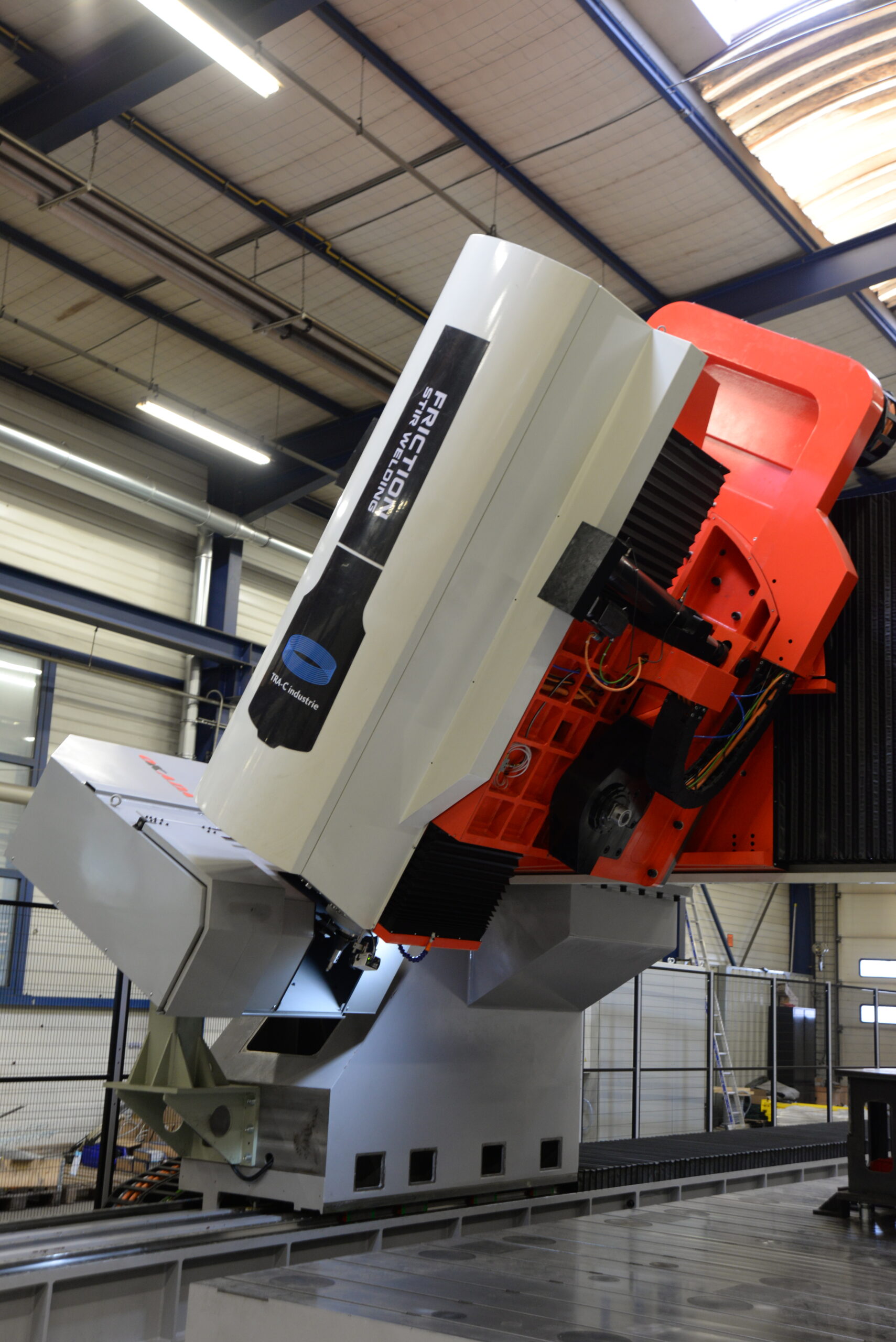FSW in the energy sector: challenges and benefits
FSW in the energy sector is increasingly becoming the solution of choice. Faced with environmental and economic challenges, the energy industry is looking to adopt reliable, efficient, low-cost and sustainable technologies.
Friction stir welding (FSW) is a solid-state welding process that has revolutionized the world of industry. It uses the heat generated by friction to join materials, making it particularly suitable for hard-to-weld metals!
FSW offers considerable advantages in terms of mechanical strength, weld quality and energy system performance. Applications range from renewable energies to oil and nuclear infrastructures.
But what are the challenges faced by the energy sector? What are the benefits of FSW for the energy sector? And what are the process’s current applications? In this article, TRA-C industrie tells you more about friction stir welding and its advantages…

The energy sector: strategic challenges
The energy industry is a particularly demanding sector, subject to strict regulations. As a result, the welding challenges in this sector are numerous. These include:
- Reliability of infrastructure: energy infrastructures have to withstand extreme conditions (high pressures, variable temperatures and corrosive environments). High-quality welds are therefore essential to guarantee the safety and longevity of installations;
- Cost efficiency: companies in the energy sector are also looking to minimize production and maintenance costs. Welding methods must therefore reduce the costs associated with repairs, downtime and production losses;
- Compliance with standards: regulations impose stringent criteria on weld quality, impact resistance and ability to withstand extreme conditions. Failure to comply with these standards can result in severe penalties and jeopardize the viability of energy projects;
- Sustainable development: welding methods must also evolve to consume less energy, emit fewer greenhouse gases and produce less waste. This is essential to align the energy sector with the objectives of sustainable development and ecological transition;
- Training and skills: evolving welding technologies require a skilled workforce capable of mastering new techniques. Ongoing operator training is therefore a key factor to ensure weld quality and maintaining competitiveness in the energy sector.
The benefits of FSW in the energy sector
FSW in the energy sector offers a number of advantages for industry players, both technically and economically. These include:
- Improved weld quality: one of the main benefits of FSW is the absence of common defects such as cracks and porosities. This reduces the risk of failure in demanding environments (oil, gas, nuclear);
- Reduced production costs: friction stir welding does not require consumables such as shielding gases and filler materials. The result is substantial long-term savings;
- Reduced maintenance costs: the high quality of welds produced with FSW also reduces the need for rework and corrections. This technology is therefore of interest to companies seeking to improve their productivity;
- Respect for the environment: FSW is an environmentally-friendly welding process. The absence of emissions, radiation, greenhouse gases and consumables enables companies to limit their carbon footprint;
- Enhanced competitiveness: thanks to FSW, companies can also position themselves at the cutting edge of technology. It allows them to optimize manufacturing processes and produce faster;
- Increased opportunities for innovation: FSW finally makes it possible to join materials that are difficult to weld, such as aluminum or combinations of metal. This makes it possible to design lighter, higher-performance structures.


Friction stir welding challenges for energy players
FSW in the energy sector presents significant technical challenges. Some complex alloys and dissimilar metals require precise adjustment of welding parameters to ensure optimum results.
In economic terms, the initial investment in FSW equipment and operator training represents a challenge for companies. However, this obstacle is often offset by the savings made in the long term.
Integrating FSW into existing energy infrastructures can also pose practical challenges. Production lines need to be adapted and made compatible with current standards.
Finally, awareness and acceptance of this technology by the industry represent another major challenge. Although promising, FSW is not yet recognized by all industry players. This limits its adoption on a large scale…
Concrete applications of FSW in the energy sector
FSW in the energy sector offers innovative solutions for improving the sustainability and performance of infrastructures. As a result, it is used in a wide range of applications:
- Wind turbine blades: FSW is used to join aluminum and light-alloy panels. It enables strong, lightweight welds;
- Solar panels: this technology can also be used to weld the panels’ aluminum frames. It guarantees greater durability and corrosion resistance;
- Gas storage tanks: the FSW is used to weld high-pressure aluminum or stainless-steel tanks. It ensures a perfect seal;
- Oil and gas pipelines: FSW can also be used to create long, continuous welds. This minimizes the risk of leaks;
- Components for nuclear power plants: this process is perfect for assembling critical parts. It reduces the risk of failure under extreme pressure and temperature conditions;
- Batteries for energy storage: as in the e-mobility sector, aluminum cases are often welded with FSW. This ensures better thermal management and increased durability;
- Construction of offshore structures: friction stir welding is finally being used to assemble oil and wind platforms. It ensures high resistance to harsh marine conditions.


FSW innovations and developments in the energy industry
Innovations of FSW in the energy sector are numerous. The introduction of welding tools with adaptive designs enables parameters to be adjusted in real time to variations in materials and thicknesses. This is useful when assembling parts with complex configurations.
Recent developments include the integration of FSW into automated processes, increasing production precision and efficiency. These automated systems deliver high-quality welds with excellent repeatability!
Research is also focused on improving tools and welding parameters to optimize FSW performance in extreme environments. The aim is to enhance weld strength for offshore platforms and nuclear reactors.
Finally, the integration of AI and machine learning improves real-time control of welding parameters. These technologies are ideal for optimizing the FSW process. They increase the precision and reliability of welds…
TRA-C industrie, specialist in FSW in the energy sector
The energy sector is demanding. It has to meet economic, environmental, regulatory and performance challenges. In this context, it is essential to optimize all processes, machines and components, as well as welds.
Expert in FSW in the energy sector, TRA-C industrie has 10 production sites in France, a technical design office, an R&D department, a workshop in Canada and partners such as UIMM. We are therefore able to deal with all kinds of energy-related projects!
We design, build and maintain solutions for a wide range of industrial applications in this sector: special machines, customized equipment and mechanical components, panels of all sizes, small and large production runs, etc.
TRA-C industrie supports customers in the nuclear, renewable and thermal energy sectors, both in France and abroad. Our teams also operate in the cryogenics, petrochemical and hydrogen sectors…









